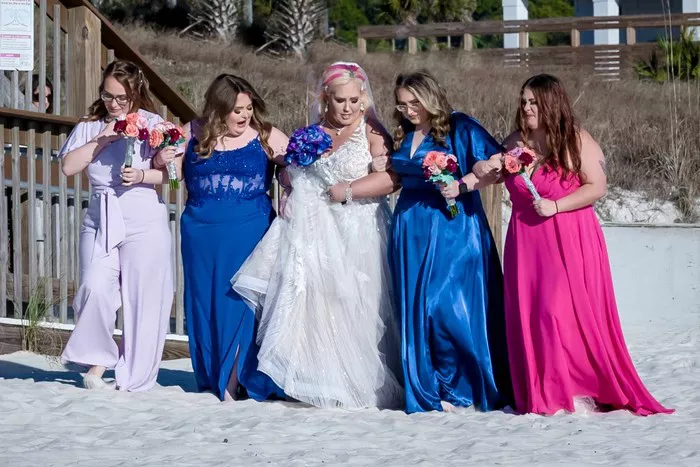Purchasing wedding dresses wholesale is an excellent option for bridal boutiques, online retailers, and even event planners looking to stock up on elegant gowns at reduced prices. Wholesale buying offers significant cost savings and access to a wide variety of styles, making it a lucrative business opportunity. However, it requires careful research, negotiation, and an understanding of the wedding dress market.
In this article, we’ll explore the steps to buying wedding dresses wholesale, covering important aspects such as sourcing suppliers, evaluating quality, understanding pricing, and ensuring a successful transaction.
Understanding the Wholesale Wedding Dress Market
The wedding industry is a multi-billion-dollar sector, with demand for bridal gowns remaining high year-round. Wholesale suppliers cater to businesses looking to purchase bulk quantities at lower costs. These suppliers include manufacturers, distributors, and specialized wholesale bridal retailers.
Buying wedding dresses wholesale allows businesses to:
- Access exclusive designs and collections.
- Benefit from bulk discounts.
- Customize orders based on customer preferences.
- Increase profit margins.
Step-by-Step Guide to Buying Wedding Dresses Wholesale
1. Determine Your Business Model and Requirements
Before sourcing wedding dresses, define your business model. Are you operating a brick-and-mortar bridal boutique, an online store, or a rental service? Your business type will influence the volume and style of wedding dresses you need.
Consider factors such as:
- Target customer demographics (e.g., luxury brides, budget-conscious brides, destination weddings).
- Types of dresses (e.g., traditional, modern, lace, ball gowns, A-line, mermaid styles).
- Seasonal demand and trending designs.
2. Research and Identify Reliable Wholesale Suppliers
Finding a trustworthy supplier is key to ensuring quality and affordability. Here are some ways to locate reputable wedding dress wholesalers:
Online Wholesale Marketplaces – Websites like Alibaba, DHgate, and Made-in-China feature numerous wedding dress suppliers.
Trade Shows and Bridal Expos – Events like Bridal Market and The National Bridal Market Chicago showcase manufacturers and distributors.
Direct Contact with Manufacturers – Many wedding dress brands offer wholesale pricing for bulk orders.
Wholesale Directories – Websites like SaleHoo and Worldwide Brands list verified wholesale wedding dress suppliers.
3. Verify Supplier Credibility and Product Quality
Before committing to a supplier, conduct thorough research to verify their credibility. Here’s how:
Check Reviews and Testimonials – Look for customer feedback on online forums, social media, and business directories.
Request Samples – Order a sample dress to assess fabric quality, stitching, and overall craftsmanship.
Verify Business Credentials – Ensure the supplier has proper business licenses, certifications, and a history of fulfilling orders.
4. Understand Pricing and Minimum Order Quantities (MOQs)
Wholesale prices vary based on factors such as:
- Fabric type (e.g., silk, lace, chiffon).
- Dress complexity and design.
- Customization options.
- Order quantity.
Many suppliers require a Minimum Order Quantity (MOQ), meaning you must purchase a set number of dresses per order. Some suppliers may offer lower MOQs for new businesses, while others may require bulk orders to provide discounted rates.
5. Negotiate Terms and Payment Options
Once you’ve identified a supplier, negotiate favorable terms, including:
- Bulk pricing discounts.
- Return and exchange policies.
- Payment terms (e.g., deposits, installment options).
- Delivery times and shipping costs.
Suppliers often accept payments via bank transfers, PayPal, or escrow services. Be cautious when dealing with new suppliers and avoid paying large sums upfront without proper guarantees.
6. Choose Between Ready-Made vs. Custom Designs
Wholesale suppliers offer two main types of wedding dresses:
Ready-Made Dresses – These are pre-designed gowns available in bulk. They are cost-effective and ideal for fast-moving inventory.
Custom-Made Dresses – Some suppliers offer customization services where you can modify designs, fabrics, and embellishments to suit your brand’s style. While more expensive, custom dresses can set your boutique apart from competitors.
7. Factor in Shipping and Import Regulations
If purchasing from an international supplier, consider shipping costs, customs duties, and import regulations. Some tips include:
- Choosing express shipping services for faster delivery.
- Understanding import taxes in your country.
- Working with a customs broker to handle documentation.
8. Establish a Strong Relationship with Your Supplier
Building a long-term relationship with a supplier can lead to better deals, priority service, and access to exclusive designs. Maintain open communication, provide feedback on products, and place consistent orders to strengthen the partnership.
9. Market and Sell Your Wedding Dresses
Once your inventory arrives, focus on marketing and selling your dresses through:
- Social media advertising (Instagram, Pinterest, Facebook).
- Bridal shows and fashion events.
- Collaborations with wedding planners and photographers.
- Offering promotions or discounts for early buyers.
Conclusion
Buying wedding dresses wholesale can be a profitable business venture when done correctly. By carefully researching suppliers, verifying quality, negotiating terms, and understanding pricing, you can source stunning wedding gowns at competitive prices. Whether starting a bridal boutique or expanding an existing business, following these steps will help ensure success in the wedding dress market.

